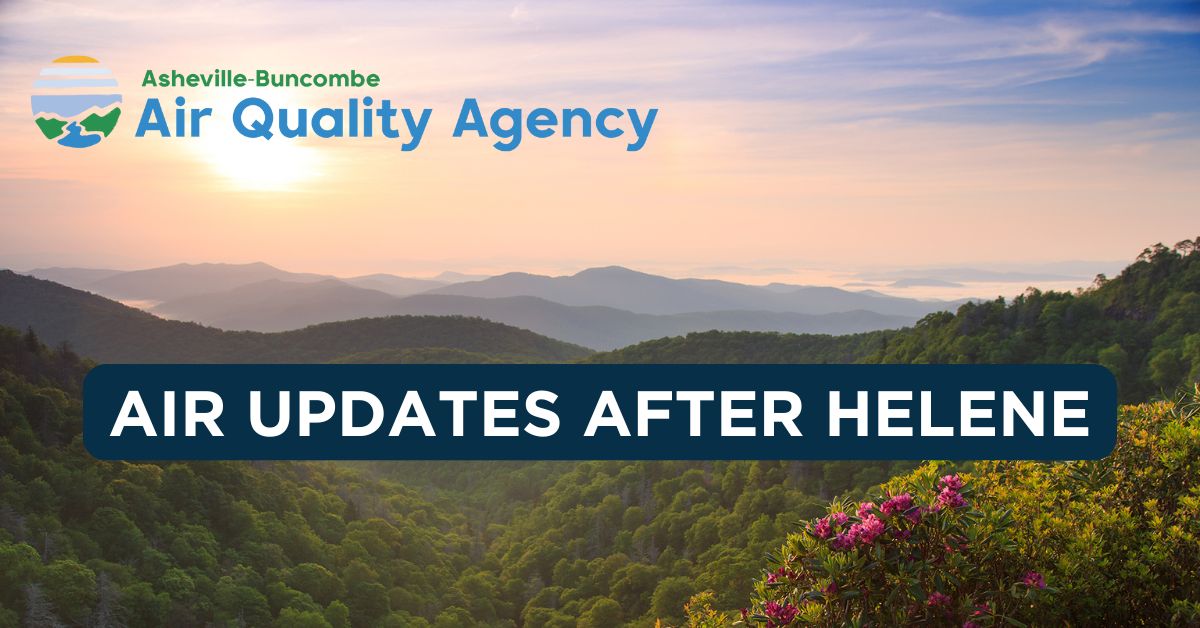This news item expired on Saturday, October 18, 2025 so the information below could be outdated or incorrect.

Air quality is impacted by major events like hurricanes, below is some additional information to consider.
Air Quality Index and Additional Temporary Monitors
Asheville-Buncombe Air Quality Agency (AB Air Quality) monitors air quality that is reported in the Air Quality Index by EPA and in the weather forecasts. The Air Quality Index is generated from data collected at monitoring sites throughout Western North Carolina. It is reporting air quality for two pollutants, ground level ozone and fine particulates. Fine particulate pollution could be affected by smoke from open burning of storm debris or dust from storm damage. The Buncombe County fine particulate monitor is located at the Board of Education in Emma. The Air Quality Index (AQI) is meant to give an indication of air quality conditions for a general area and does not give specific information on a smaller scale and may not be representative of the air quality in Swannanoa or Fairview for example.
In coordination with the North Carolina Division of Air Quality (NCDAQ), and EPA, AB Air Quality has installed non-regulatory fine particulate monitors and sensors in key areas to complement our regulatory monitors and collect data about potential air quality impacts from open burning of storm debris. That data along with the regulatory monitoring data used for the AQI is available on the EPA’s AirNow fire and smoke map.
.jpg)
Above: Low-cost sensors installed after Helene by AB Air Quality, NCDAQ, and EPA highlighted in red.
Indoor Air Quality
AB Air Quality recommends wearing a N95 dust mask or respirator, goggles, gloves and other personal protective equipment when cleaning up storm debris and cleaning out homes that have been affected by flooding. We are also recommending that municipalities use water trucks to minimize dust on roads. The Swannanoa Community Care Station has a supply of N95 masks that are available to residents in the area.
Generators, gas or camp stoves, and fuel burning lanterns all produce carbon monoxide or CO which can kill you in minutes if you breathe it in.
More information on precautions you can take related to flooding including mold, asbestos, lead, and other concerns are available from EPA at www.epa.gov/flooded-homes.
Residential Open Burning:
The Buncombe County, City of Asheville, and other municipalities are providing storm debris pick up for residents. Asheville-Buncombe Air Quality Agency is encouraging residents to not burn the material and allowing the material to be picked up and disposed of with the collection services offered. Buncombe County has a private property debris removal program that may be able to assist with material that cannot easily be moved to the street for pick up, more information is available at engage.buncombecounty.org/buncomberecovers. The Agency would like to remind residents that the burning of leaves, brush, and yard trimmings is permitted on burning days between 8 a.m. and 6 p.m., however the burning of household trash, building materials, asphaltic materials, card board, processed wood, and papers is prohibited at any time. To find out if it is a burning day, please call 828-250-6767 or go to www.abairquality.org. Burning is not allowed in the City of Asheville or other municipalities where public pick up for yard waste is provided including the Towns of Biltmore Forest, Black Mountain, Montreat, Weaverville and Woodfin. Per the Buncombe County Fire Code, fires must be attended at all times.
Other Open Burning
For storm debris that is being gathered with the intention of conducting open burning including the use of air curtain burners or open burning of storm debris by a business or other commercial or government entity, permission is required by the Asheville-Buncombe Air Quality Agency and there are certain requirements that must be met. Please contact the Agency at 828-250-6777 or at airquality@buncombecounty.org. Further details about these requirements can be found at abairquality.org. Under no circumstances should anyone burn synthetic materials or trash.
Demolition and Asbestos Removal
A permit must be obtained from AB Air Quality for any plan to demolish or remodel any building in Buncombe County including residential, commercial, industrial or public buildings; or for any plan to remove any asbestos-containing material. Some projects are subject to the National Emissions Standards for Hazardous Air Pollutants for Asbestos and have additional requirements. To see if a project is subject to this regulation, please read AB Air Quality's Asbestos NESHAP Program Brochure. A permit can be obtained online by registering with the Buncombe County Permits Portal and and clicking the Air Quality tab to start the application. Below are some resources for asbestos information:
General Guidance
- If it looks or smells dusty or smoky outside, it's probably not a good time to work in the yard, go for a run, or for kids to play outdoors.
- If you see or smell smoke present, you should: